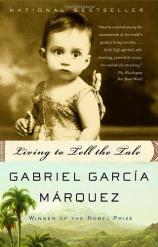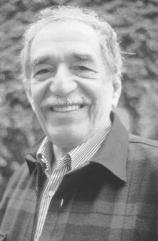Reading Group Guide
Discussion Questions
Living to Tell the Tale

1. The book's multilayered title --- Living to Tell the Tale --- is given greater significance because García Márquez has been fighting lymphatic cancer since 1999. He has called this misfortune "an enormous stroke of luck" since it gave him the impetus to write his memoirs. The Spanish title --- Vivir para contarla --- means "to live to tell it." What other shades of meaning might the title suggest?
2. The memoir begins, "My mother asked me to go with her to sell the house" [p. 3], and then weaves a story of how and why that day was unforgettable: "This simple two-day trip would be so decisive that the longest and most diligent of lives would not be enough for me to finish recounting it. Now, with more than seventy-five years behind me, I know it was the most important of all the decisions I had to make in my career as a writer. That is to say: in my entire life" [p. 5]. The sentence is reminiscent of many moments in One Hundred Years of Solitude, when an event is identified as setting in motion the story and the meanings that flow from it. If García Márquez is deliberately tying a moment in his own life to certain moments in his fiction, where a decisive, unforgettable experience is illuminated and obsessively returned to, what is he suggesting about the nature of his own story?
3. What is the tone in which García Márquez recounts his life? How intimate is his relationship with the reader? What is his own attitude toward his younger self?
4. The story opens with a family crisis. At twenty-three, Gabriel has left the university and has no intention of returning. "My father . . . would have forgiven me anything except my not hanging on the wall the academic degree he could not have" [p. 9]. At one point his father tells him, "You hold the fate of the family in your hands" [p. 425]. How is this difficulty negotiated, and what does it tell us about the rights and responsibilities of family members in Caribbean culture? Is García Márquez's early life determined by the wishes of his parents and the economic needs of his family or by his own desires?
5. The epigraph states, "Life is not what one lived, but what one remembers and how one remembers it in order to recount it." In Living to Tell the Tale, how does memory shape meaning and identity?
6. The child Gabriel has memories that could not have taken place, which gives him "a bad name in the house for having intrauterine memories and premonitory dreams" [p. 70]. What is the role of prophecies, dreams, and irrational fears in the story of García Márquez's life?
7. García Márquez writes, "I needed this old age without remorse to understand that the misfortune of my grandparents in the house in Cataca was that they were always mired in their nostalgic memories, and the more they insisted on conjuring them the deeper they sank" [p. 70]. He suggests that nostalgia does not play a significant role in his own life. How important is the concept of nostalgia to his fiction? What is the difference between nostalgia and the creative mining of memory?
8. Unforgettable and fantastic incidents of life in Aracataca --- the exorcism of his Aunt Wenefrida [p. 82], the violence of the "Black Night of Aracataca" [p. 46], the massacre of the banana workers [pp. 62--63] --- are narrated in the second chapter. These events, and many others, became a part of García Márquez's personal mythology and made their way into his fiction. But, as he says of the "Black Night of Aracataca," "there is no certain evidence it ever really happened" [p. 46]. How does the memoir address this question of the way the imagination contributes to individual and collective history?
9. García Márquez writes, "I believe that the essence of my nature and way of thinking I owe in reality to the women in the family and to the many in our service who ministered to my childhood" [pp. 74--75]. Why were women so important to him? How are the women different, in roles or in attitudes, from the men in García Márquez's life? How does he portray his relationship with his mother?
10. García Márquez says of his father, "Papá was a difficult man to see into or to please. He was always very much poorer than he seemed and considered poverty a hateful enemy he could never accept and never defeat" [p. 56]. How does the memoir portray García Márquez's relationship with his father, and what situations were crucial in determining his feelings about his father?
11. In light of the rootlessness of contemporary American middle-class life and the loosening of bonds among members of extended families, discuss García Márquez's immersion in community, family, and friendships. Do you see his extraordinary connectedness as determined by his own temperament, by Latin American culture, or both?
12. Critic Michael Wood has noted that the book suggests "again and again, that the world this writer grew up in was effectively a García Márquez novel before he even touched it" [London Review of Books, 3 June 2004, p. 3]. García Márquez himself comments on this phenomenon when he writes, "It was not one of those [stories] that are invented on paper. Life invents them" [p. 528]. Is it true that the sense of fecundity, the density of inspiration, and the frequent occurrence of improbable happenings provided García Márquez with exactly what he needed for his art? Discuss a few events in his novels that you now know have their origins in the author's life.
13. The memoir conveys the boy's immense love of books and his hunger for learning. He could memorize long passages of poetry and countless songs, and his teachers were very much aware of his gifts. How important to his formation as an artist were the various schools he attended? Does the memoir suggest that his education served and shaped his vocation or that García Márquez would have become the writer he is regardless of his schooling?
14. "The truth of my soul was that the drama of Colombia reached me like a remote echo and moved me only when it spilled over into rivers of blood" [p. 401]. What does the memoir convey about Colombia's troubled political history? How critical to García Márquez's formation as an adult was the assassination of Jorge Eliécer Gaitán and the violence that followed [pp. 312--13]? How is the experience of political upheaval here reflected in the historical or political consciousness of his fiction?
15. "I would light a cigarette without finishing the one before, I would breathe in the smoke with the longing for life seen in asthmatics gulping down air, and the three packs I consumed each day were evident on my nails and in an old dog's cough that disrupted my youth. In short, I was shy and sad, like a good Caribbean, and so jealous of my intimate life that I would answer any question about it with a rhetorical digression. I was convinced my bad luck was congenital and irremediable, above all with women and with money, but I did not care, because I believed I did not need good luck in order to write well. I did not care about glory, or money, or old age, because I was sure I was going to die very young, and in the street" [p. 401]. Consider the various elements of this quotation in which García Márquez describes the young man he was on the day his mother came to ask him to help sell the house. How did his journey up the Magdalena River that day change him?
16. How important was journalism to García Márquez's formation as a writer, and how does it relate to his fiction? If you have read The Story of a Shipwrecked Sailor, News of a Kidnapping, or Chronicle of a Death Foretold, how is his style of narration in these books influenced by the journalist's craft? He writes, "The novel and journalism are children of the same mother" [p. 290]. What does he mean by this?
17. García Márquez writes of his maternal grandparents' house, where he spent the first eight years of his life, "I cannot imagine a family environment more favorable to my vocation than that lunatic house" [p. 90]. Which aspects of this household, and which people in it, have the strongest impact on the creative life of the child?
18. The structure of the memoir and the movement of time within it are unique. Is the story given in a strictly chronological order? What is the effect of the use of time?
19. In his Nobel Prize lecture entitled "The Solitude of Latin America," García Márquez wrote, "Poets and beggars, musicians and prophets, warriors and scoundrels, all creatures of that unbridled reality, we have had to ask but little of imagination, for our crucial problem has been a lack of conventional means to render our lives believable. This, my friends, is the crux of our solitude." The memoir is one of the "conventional means" by which writers render reality believable; what role does this memoir play in rendering Latin American --- particularly Colombian --- life believable and thus in lessening its isolation from the rest of the world?
20. Regarding the countless interviews he has given throughout his career, García Márquez says, "An immense majority of the ones I have not been able to avoid on any subject ought to be considered as an important part of my works of fiction, because they are no more than that: fantasies about my life" [p. 489]. In a memoir, as opposed to an interview, an author controls the way he is viewed by the public. What truth about himself and his life does García Márquez seem to want to convey?
Living to Tell the Tale
- Publication Date: October 12, 2004
- Genres: Autobiography, Nonfiction
- Paperback: 533 pages
- Publisher: Vintage
- ISBN-10: 140003454X
- ISBN-13: 9781400034543







